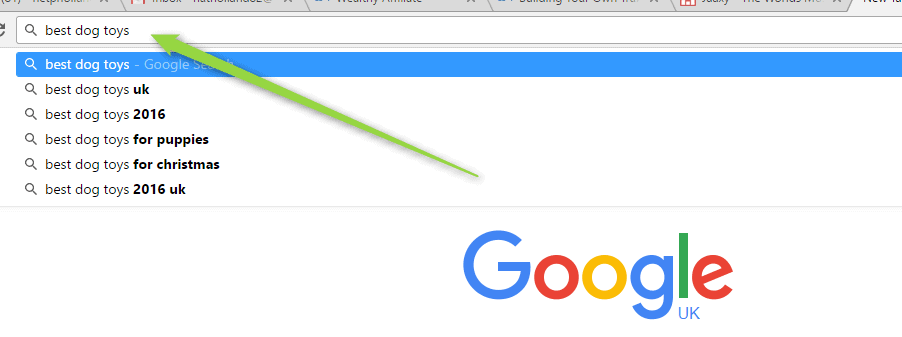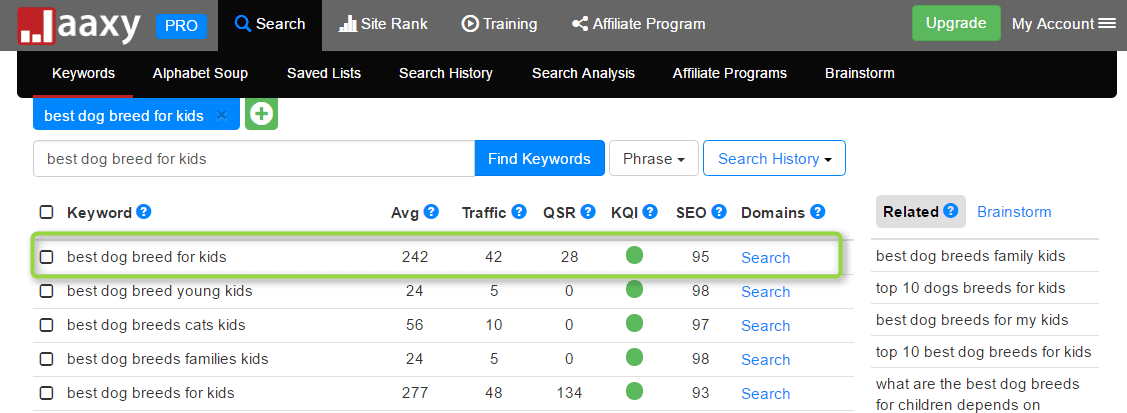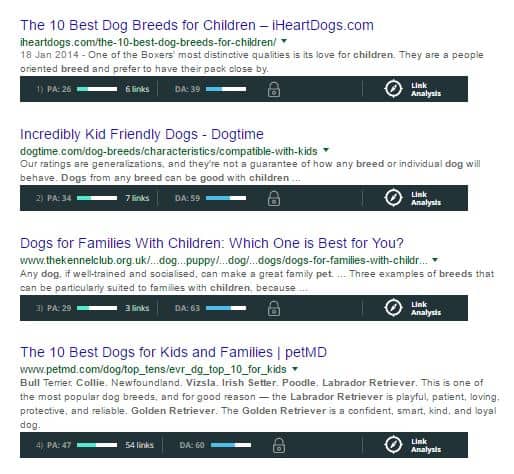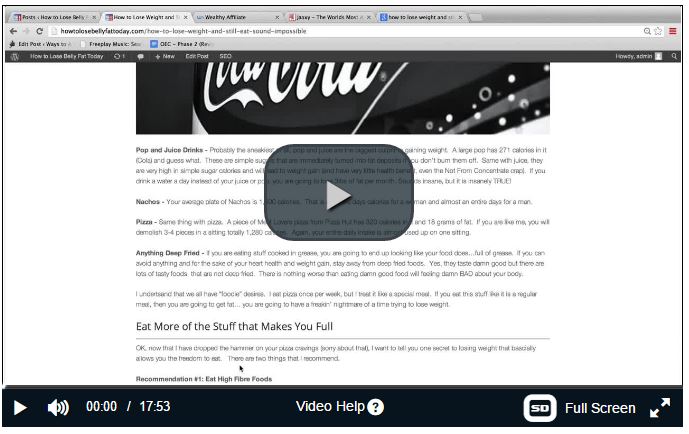
What Are Long tail Keywords About? I’ll Explain!
One of the most confusing things for people starting out online, is keyword research.
I see a lot of people coming online, who are maybe a few months, or even a year down the road – and don’t understand why they don’t have any traffic and are not ranking for the keywords they’ve targeted.
There are several reasons for this, so I thought I’d break some of this down for you guys and hopefully help you from making some of those same mistakes.
So, What Is A Long Tail keyword?
A long tail keyword will be three, four or more words long – a sentence or phrase that you target, that people are already searching for online.
People ask questions online every day and google tracks all of those questions or queries.
If you have a keyword research tool, you can find out how many people are searching for specific phrases and how much competition there is for that keyword phrase.
That is, how many people are ranking for that exact keyword in the search engine.
However, going after a long-tail keyword is not enough, because millions of long tail keywords are also still competitive to rank for.
So, especially if you’re starting out, you need to go for a long-tail keyword that is also low in competition, (as shown in your keyword research tool)….
AND that you have physically checked the keyword out in the search engine, (I will elaborate on that later on).
For the purposes of this post, I am going to be using Jaaxy – it’s the keyword research tool I use and you can get 30 free searches yourself here now and use it as we go along.
Alternatively, you can see my post on the google keyword search tool, which is free – but not brilliant.
Going For The Low-Competition Keyword:
If you go for longer-tail keywords, with far lower search volume, (lets say, 50 searches per month) you will generally find that less people are trying to rank for it.
Even though that traffic may be small – the reality is, you don’t just rank for that keyword, you rank for others too.
As your sites authority grows, you additionally start ranking for the higher competition keywords, that maybe already embedded in your title, or other ones you never intended to target.
Once you start becoming an authority site, Google is gives you some credit.
Truth me known, I target some keywords with much lower search volume than 50 a month – I even go for some with zero searches a month!
Why?
Because guess what… it may say zero searches a month on your keyword search tool, but remember you will rank for other keywords within that post and it actually WILL get some searches a month in any case…
Over time, that traffic/search volume also often increases and by then, you could already be in the top spot on Google.
This can also be particularly profitable if say, you’re reviewing a brand new product that’s not been released.
The search volume is zero, because that product hasn’t come out – but in a months time, thousands of people may be searching and you could already have a post on page 1.
Targeting long-tail, low-competition keywords is not just for new people starting out either, it’s something I do with a majority of my posts and is what’s led me to many page 1 rankings.
Don’t imagine that just because you’re targeting these keywords that you’ll automatically jump to page 1 though…
When my blog was brand new, I still went in on page 3, or further down – even if they keyword was really low competition. That’s just because my site didn’t have any authority yet.
If you’re consistent with you’re posting over time, Google will start to push your posts up in the rankings.
Related post: What Is SEO Content Writing?
How Do You Find Long Tail Keywords?
A really simple way to discover a whole range long tail keywords, is via google instant.
Whenever you go into google and start typing something, a range of other phrases will come up.
Look what happens when I start typing into google… “best dog toys…”

A selection of other related keywords pop up and these are things that have recently been searched, so they’re often good to check out.
And you can expand this by going through the alphabet – for example, best dog a… best dog b… best dog c… and a how range of distinct keywords will come up and give you ideas.
Related post: The Alphabet Soup Technique.
So, you can now take your ideas and plug them into your keyword search tool.
I went to check out the keyword: “best dog breeds for kids.”
This is a keyword that I discovered whilst doing that technique above.
I plugged it into jaaxy and these were the results.

If you look at the info for that keyword in the above image, I’ll explain what they mean below.
AVG: 242, (this is the WORLDWIDE number of searches for this keyword per month).
TRAFFIC: 42, (this is the number of clicks you may get each month to your post, if you’re on page 1).
QSR: 28, (the amount of competition you’ll have, posts that are also targeting this keyword).
KQI: green (keyword quality indicator – all things considered, whether this is a quality keyword worth targeting – green is good, orange is OK, red is bad).
SEO: 95 – (score based on the competition/traffic. The closer to 100, the better your chances of ranking).
So, on the face of it, this looks like a reasonable long-tail, low-competition keyword.
But just doing this is not enough – see why in a moment.
You may thinking, 42 visits a month – that’s not much.
Well, it’s much better to target something with low traffic and actually receive some highly targeted visitors – than to not rank at all, or be several pages into the search and receive zero visitors.
The great thing about targeting these keywords is the traffic does build up over time and you start ranking for additional, higher competition phrases too.
But WAIT…. don’t write that post yet!
Sometimes, using a keyword search tool will give you a false sense of security.
Many people will find a bunch of low-competition keywords and then just start writing right away, but that would be a mistake.
The competition may only be “24…” but the first 10 of those may be from really high authority sites, that you won’t have a chance of outranking.
And if you don’t have any hope of reaching the first page, (if not now, then further down the road) there is no point in attempting it.
(UNLESS.. you’re doing a post where your intention is not just to rank. For example, you’ll want to write posts because they add more value to your site, even if you don’t rank for them. Maybe you’re going to link to those posts from your other content, maybe you’re going to make it a post that you share a lot on social media and so on…. ).
Checking Your Keyword In Google:
I use the MOZ bar to help me determine the authority of certain posts and pages in the search – it’s free to download, you can get it here.
Here were the top results…

So, all of the top results, in fact the entire front page, was full of pretty high authority sites.
Both the PA, (page authority) and DA, (domain authority) were high.
If your website or blog is relatively new, your chances of outranking them would be extremely unlikely.
So, this is a prime example of when something looks like it could be a reasonable keyword, but it’s actually not as good as it seems.
While you can have the chance of outranking some higher authority sites later, particularly with your own epic content – for starters, you may want to fight some battles you have a better chance of winning.
So, what I’d do in this case, is go back and see some of the other related keywords – for example, there had been one with lower traffic, but apparently zero competition.
I’d take the same steps and check out the results in google and go on from there.
Some Other Common Reasons Why You May Not Rank….
As well as not checking out the real competition in the search results, there are some other key ways that I find people are not ranking for their targeted keywords.
One common reason that I see, is they’re not properly implementing SEO techniques.
For example, they may have zero internal links; they may limited images; their keyword placement may be off and their post may be way too short – to name just a few.
Related Post: 7 SEO Content Writing Tips For Beginners.
Also, they may need to pay attention to the quality of the posts, including the quality of images and the actual text.
Too many people starting out have massive blocks of text and it makes very difficult to read…
Short paragraphs can make a huge difference when it comes to readability.
Go to the front page, see the posts ranking in the top 5. Ideally, you need your content to be better than that.
You don’t want it to overwhelm you, if you think you’re no where near at that level yet – but the point is, you need to aim for that and later on, when you’ve improved then you can go back and improve your posts as well.
Another biggie…
is that some people go into very high competition niches and write lots of content that they believe should rank, but there is a problem:
People ranking in the top spots for those apparent “low-competition,” keywords have massive authority and they may rank for certain keywords, without even having the exact keyword in their title.
While this doesn’t mean you won’t outrank them eventually, it does mean that it will take you much, much longer to do so AND if you have any hope of doing so, you also need to be creating really awesome content – and doing good SEO.
If you’re in a competitive niche AND your content falls short, you’re not going to have any chance, not only of ranking well, but of having visitors that actually stick around and engage with your site.
If you’re interested in seeing some of the content I’ve been discussing via video training, there’s a great lesson below that very clearly states everything you need to know.
Low Hanging Fruit Video Training
Click on the image – The Video Will Open In A New Window.
The training video above is from WA & if you’re interested in more training like it, you will have the option of joining their free starter membership.
I hope you found this post helpful, is there anything I missed?
If you have any questions, let me know in the comments!
All the best…


So the one thing I really took away from this was the idea of finding long tail keywords, or really just keywords in general that have 50 or less, or maybe even 0 searches which in turn will mean little to no competition and if that keyword was to blow up in the future you would have a major head start and dominate position because likely you would be ranked high or top first page. Am I understanding this right? Thanks!
Hi, well yes – it doesn’t always mean there is NO competition but there may not be much. Also, yes sometimes the competition will be low because a product, (e.g.) has yet to be released, so if you can rank on the first page then, you’ll be in a good position! Thanks for your comment!